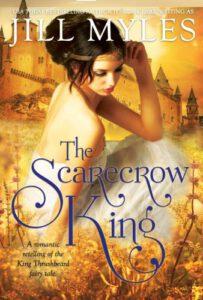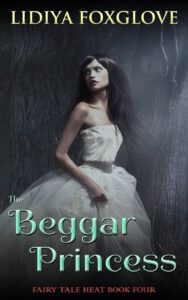King Who?
Whenever someone asked me what my favorite fairy tale was, I would answer “King Thrushbeard.” It’s a lesser known little tale that has nothing to do with STDs and no, it isn’t another name for Bluebeard either, although there might be similarities in its theme.
Today, my answer to the question above would be different, but during my formative years, this little tale left a considerable impression. The baby kinkster in me was probably drawn to the powerful theme of punishment underlying it.
If you’re interested in reading the story for yourself, you can find it here. If you want to listen to it being read and reviewed, Adam Field and Matt Hughes did a Grimm Reading of it here. You can find another discussion on the Archetypes and Anarchy Podcast here. Or you can keep reading for my little recap down below. It got a little snarky, I admit.
Of course, as a love interest, King Thrushbeard is rather problematic. Mari Ness calls King Thrushbeard “a gaslighting fairy tale” on Tor.com. After all, this king tells the princess he married in disguise that all the misfortune that befell her “happened because she once insulted him, so he had to do it, out of love for her.” By wrapping the tale up with a happy ending, it thus sanctions emotional abuse, Mari Ness argues.
And yes, viewed through a modern lense, the tale is ripe with icky aspects: arranged marriage to a minstrel as punishment, humiliation and deception in the name of teaching a lesson and correcting the wilful woman’s ways. But I can also see the potential that fascinated me as a fledgling pervert: the concept of punishment, a dominant (albeit abusive, oops) hero, and a heroine talking back and prevailing against the odds.

King Thrushbeard — not your usual fairy tale
The tale starts off with our princess ridiculing a long row of suitors—to their faces, no less— presented to her so she can pick a husband:
“So she had something to say against every one, but she made herself especially merry over a good king who stood quite high up in the row, and whose chin had grown a little crooked. “Well,” she cried and laughed, “he has a chin like a thrush’s beak!” and from that time he got the name of King Thrushbeard.”
First: WELP. Watching someone being so openly rude is extremely uncomfortable. As women, we are conditioned to be nice, docile, polite. The consequences of being brash towards men can be devastating. So, this princess unabashedly roasting her suitors? Girl, you got balls. But we can already tell this won’t go over well. Our narrator sides firmly with “the good king”—who isn’t very good at all.
And her father? He promises to marry her to the first beggar who comes to his doors. Because he can. And a princess doesn’t have much to say about her fate, obviously. Punishing her for rudeness with marriage for life to a beggar isn’t out of proportion or anything. (Alright, her slights could have potentially devastating consequences for his kingdom, and this party is a catastrophe for diplomatic relations, but come on.)
Not only does he marry her off to the first beggar in dirty clothes fiddling beneath his window, he promptly evicts her from his castle, since she’s a beggar’s woman now. Father of the year, he is not.
The beggar whisks her away (on foot), traveling through forests and meadows and towns that all belong to King Thrushbeard, as he points out. He’s got to rub it in by taking the scenic route. The poor princess soon regrets her life choices: If only she’d taken King Thrushbeard, all of this could be hers. The princess is probably in too much shock to notice her new husband’s oddly specific knowledge of her dating history; for someone who allegedly wasn’t present at her snark-fest he knows a lot. And he gets a little peeved to hear her lament not taking Thrushbeard for a husband:
“It does not please me,” said the fiddler, “to hear you always wishing for another husband; am I not good enough for you?”
Does he want an honest answer, or…
At last they reach a little hut where they are going to live together, and the minstrel goes to put his new wife to work once their provisions are gone. Understandably, she isn’t very talented at the menial tasks lower-class women do to make a living.
Weaving baskets and spinning yarn fall through, and when she has some success selling earthenware pots on the market, a drunken hussar just so happens to ride through her wares and shatter them all. Her charming husband blames the loss on her for choosing a poor spot on the market square. But he gets her another job as a kitchen maid at the palace.
There, her worst humiliation yet takes place: When (presumably) watching the king’s son’s wedding, she recognises him as King Thrushbeard. When she wants to run, he catches her, and the jars she’s sewn into her skirts to carry home leftovers from the kitchen break. There she stands, covered in leftover food, and King Thrushbeard reveals that he’s her husband, because he’s not only the minstrel but also the hussar who destroyed her wares. He had to humble her, but now everything is well.
Um…??? I would cry too.
Under tears, she apologizes and wails that she isn’t worthy to be his wife (that’s one way to put it…), but he comforts her, tells her the evil days are behind them now (Uh huh) and after she changes into “splendid clothes” they celebrate their wedding with a huge party. Even her father is there to congratulate.
The amount of effort and planning the pretend-minstrel puts into punishing his new wife for her slight against his beard/chin is a little worrying, but of course no one addresses his psychopath-tendencies. I mean, which king doesn’t make time to pretend to be a beggar for months on end just to teach his wife a lesson?
All’s well that ends with a party.
Thrushbeard as template for modeling female behavior
Several aspects make the Thrushbeard fairy tale problematic. Because of the omnipresence of fairy tales from childhood on, they’ve been long viewed critically; their sometimes insidious messages pervade the stories we tell our children. Some fairy tales show us, as Neil Gaiman says, not that dragons exist but that they can be beaten. Others show us that rudeness warrants punishment and women deserve their comeuppance for speaking their minds.
Marcia Lieberman argued back in 1972 that fairy tales can be regarded as “training manuals” in passive behavior for women: “Millions of women must surely have formed their psycho-sexual self-concepts and their ideas of what they could or could not accomplish, what sort of behavior would be rewarded, and of the nature of reward itself, in part from their favorite fairy tales. These stories have been made the repositories of the dreams, hopes, and fantasies of generations of girls.”¹ Through that lense, Thrushbeard could be seen as a cautionary tale about what happens to rude, disobedient women: in order to learn their lesson, they have to get punished and humbled. According to Lieberman, “these tales present a picture of sexual roles, behavior, and psychology, and a way of predicting outcome or fate according to sex (…).”²
Person or Pawn?
The tale also shows that the princess, despite being presented with a selection of suitors, doesn’t have a choice about marrying at all. Her role is clearly defined and her function limited to that of a wife, a token of an alliance; her marriage is a contract in more than one respect. On one hand, it’s a practical, economic union between a man and a woman who support each other by forming a household; love and attraction don’t factor into this contract. On the other hand, the princess’s marriage is supposed to forge an alliance with a political partner, forming a contract between two parties. Her prompt eviction from the palace once she’s married to the beggar reflects her failure to fulfill this second, much more important function. She isn’t a person, she’s a commodity.
It isn’t quite clear if the old king was in on the princess’s deception. His attendance at the final wedding hints at his knowledge of King Thrushbeard’s plot. That, in turn, means that he knew from the start his daughter wasn’t really marrying a beggar and he forged his alliance regardless of her opinion. No matter how you look at it, it doesn’t get any better, because that also means he was okay with his daughter’s punishment through deception.
A victim and nothing but?
We can find a similar trope of a husband testing and deceiving his wife by pretending to be someone else in Dickens’ Our Mutual Friend. According to Sarah Gates, Dickens’ plot “highlights the potential for ethical and emotional abuse in the patriarchal system of courtship and marriage.”³ It can’t be denied that Thrushbeard is a dick who abuses his new wife through his elaborate scheme of petty revenge. But does she really have to accept this?
Maybe not.
Comparing Our Mutual Friend with King Thrushbeard points to another question, namely that of the legality of Thrushbeard’s marriage to the princess. Many readers are confused by the palace preparing for a wedding of the prince/king, who, as we know, is already married. Did he want to marry someone else? Why have a second marriage at all? It’s possible that this second marriage is necessary to make the marriage legal once his true identity is revealed. Thrushbeard married the princess as a beggar, presumably under a false name, which means as long as she doesn’t accept him as his true self, they aren’t married at all.
And that, right there, means the ultimate decision, the ultimate choice, lies with the princess. His success depends on her acceptance of being deserving of his lesson and submitting to it. In other words, she has all the power in her submission.
Of course, I might look too hard for female agency here. However, the opposite could be true as well: reading the story as code for permissible female behavior might go too far. Maybe it’s just a story exploiting the desire of an audience to see a better brought low, much like modern tabloids feeding into curiosity and sensation-seeking. A scandalous story made to shock and excite.
King Thrushbeard Retellings from tame to spicy
With a little tweaking (like, tone down the assholeness and pure deviousness, jeez), King Thrushbeard offers a lot of possibilities to play. Mistaken Identities, kink, arranged marriage, there’s so much to work with. And some elements need to be there to make it a King Thrushbeard retelling: the ridiculing of a bunch of suitors, (forced) marriage to a (lowly) stranger who is really one of the rejected suitors, some hardship with the opportunity for growth for the main character, and the reveal of the true identity of the stranger.
As King Thrushbeard is one of the less popular fairy tales, it’s not surprising that there aren’t that many retellings to be found. Search for “Erotic Fairy Tales” on your bookseller of choice and you can scroll for days (I know, I’ve done it, and written some myself. What can I say?) The Beauty and the Beast retellings alone go on for pages (again, I feel you, I’ve written one myself). But King Thrushbeard? The list is short.
I’ve picked the four retellings below to read; they range from chaste to drippingly explicit. There’s something for everyone there.
The Scarecrow King by Jill Myles
[one_half padding=”0 10px 0 10px”]
 [/one_half][one_half_last padding=”0 10px 0 30px”]
[/one_half][one_half_last padding=”0 10px 0 30px”]
The Scarecrow King was one of my favorite retellings that I read. Jill Myles gives her 16-year-old heroine a solid backstory and reason for her behavior; I actually despised her father, the King who married the Miller’s daughter (and then rejected her when it turned out she didn’t actually make gold. I’ve always hated the King and father in Rumpelstiltskin!) With an emotionally (and at times even physically) abusive family like that, Princess Rinda found strategies to cope with the constant rejection: She makes a nuisance of herself, throwing out money, because that is where she can needle her father best. Only, when she rejects his order to pick a suitor to marry, her plan to make herself unmarriageable by being rude backfires. Spectacularly.
This is the only retelling I read where the father/relative who did the marrying away wasn’t actually in on the plot and DIDN’T know the minstrel was in fact the King of a neighboring kingdom.
The “Father as Asshole” trope is probably what hit me so hard in this story. Give me any story with an emotionally cold, abusive father and I’m turning into a sobbing mess. The Daddy Issues are real.
The minstrel/king was a breath of fresh air in contrast to the princess’s family. Honestly, he’s so sweet. And so in love with his princess. And, in an enormous difference to the original fairy tale and most other retellings, he doesn’t actually want to deceive her; it’s a ruse born from necessity when he suddenly faces an usurper to the throne trying to off him. Though King Alek’s disguise is flimsy at best, and if the princess had been paying attention, she’d have realized that SOMETHING is off. I mean, why would assassins be after a lowly minstrel?
This was probably my biggest beef, because the princess isn’t otherwise stupid. She’s clever and brave, resourceful and willing to reflect on her own behaviour, plus she’s willing to do everything for those she loves. She saves the day with courage and her own special brand of magic the minstrel/king helped her come to appreciate (because in her Kingdom, where everyone’s got magic and true royals are not only blonde but also powerful, her small talent of bestowing luck gets constantly denigrated). And yet she has this one glaring blind spot.
Alek is not even very good at hiding that he’s hiding something. But he’s so sweet that it’s impossible to stay mad at him, plus he unabashedly celebrates Rinda’s accomplishments and cool deeds. He’s supportive.
So of course the betrayal, which inevitably comes out, hurts like hell. (I guess this isn’t much of a spoiler as it’s an integral, pivotal part of the fairytale?)
This closed-door romance is really well written, it’s fun and sweet and sometimes heartbreaking. It’s for everyone who likes a sweet read with a sprinkle of magic and a dash of adventure. It’s definitely not for anyone arachnophobic. (I read this after seeing the episode of the Mandalorian with the icky spider thingies and the visuals I had were something else.)

The Reluctant Wife by Nina Clare
[one_half padding=”20px 10px 20px 10px”] [/one_half][one_half_last padding=”20px 10px 20px 30px”]
[/one_half][one_half_last padding=”20px 10px 20px 30px”]
This retelling of King Thrushbeard reads very much like a fairy tale in the vein of Madame de Beaumont. It begins with the princess’s birth and continues with the trope of the offended fairy godmother cursing the child with a heart of stone. All this thanks to a duke greedy to become king if his uncle dies without a male heir.
Princess Elena grows up to become a callous and sometimes cruel girl, thanks to the curse of the offended fairy. After she refused all her suitors, even the prince of the neighboring kingdom everyone wants to see her marry, her father promises to wed her to the next beggar. In this retelling, however, he does this in order to break her curse, and he knows from the get go that the man he marries his daughter to isn’t really a minstrel but the prince she refused. He got that idea from one of the fairy godmothers. All the subsequent suffering the princess is put through is because a fairy said so, and that makes it all a liiiiittle iffy.
Apart from the fairies, the story follows the Grimm’s fairy tale fairly closely. Okay, minstrel and princess hitch a ride with a group of travellers (and yes, the story uses the g slur) and later on, after those travellers get captured and enslaved, take care of the one girl that escaped with the princess. But there’s basket weaving and spinning and a minstrel not at all happy with his new wife’s lack of skill with either. Like in the fairy tale, the princess then goes on to sell pottery on the market and excels at it, until, surprise, there’s a rider destroying all her wares and she gets fired. Her ordeal is far from over, since we know she has to face her ultimate humiliation as a lowly kitchen maid.
Through it all, Elena’s heart slowly thaws.
The prince/minstrel remained somewhat pale throughout the story, as he’s mostly absent. There isn’t even a kiss!
The writing is solid, and if you want to read a fairy tale close to, well, actual fairy tales, then this is for you. It offers a magical reason the princess is the way she is (through no fault of her own or her family’s) and portrays a coming of age story that isn’t rushed and at times breaks your heart a little. But of all four retellings I read all the way through, this was probably my least favorite. I just couldn’t get over the “the fairies said so” part.
The Beggar Princess by Lidia Foxglove
[one_half padding=”20px 10px 20px 10px”] [/one_half][one_half_last padding=”20px 10px 20px 10px”]
[/one_half][one_half_last padding=”20px 10px 20px 10px”]
This retelling, which deviated most from the fairy tale plot, was easily my favorite. It’s FUN. It’s also much less explicit than I expected. Sexier than both The Scarecrow King and The Reluctant Wife, it’s still not the all out smut I anticipated.
Princess Bethany is secretly a romance author; this secret career is also a real, valid reason she doesn’t want to marry: she wants to keep writing and fears a husband might interfere with this aim. Not an unreasonable fear. But she’s not keeping her career as secret as she thinks. Not only does she get fan post from a “well-meaning reader” filled with criticism of her work (I loved that; it was hilarious, and real… Readers have OPINIONS, man, and they see everything); her own father suspects her. And he’s not about to let her get away with shunning marriage.
Like in The Reluctant Wife, father and suitor-King plan the deception together, but unlike the former, in this retelling the princess suspects right from the get go that something is not quite right. She sees the likeness between “her” beggar and the Elven King Brennus whom she rejected. The cabin her new husband drags her to isn’t quite the hovel you’d expect from a real beggar, and Bethany never takes her husband’s demands quite seriously. She understands it’s a game from the start, which allows her to let go and participate in the sexy, slightly kinky games her new husband engages her in. This implicit understanding allows not only her to be comfortable with this progression of events, but the reader as well.
But King Thrushbeard — the fairy tale — hinges on the heroine learning a lesson, and the Beggar Princess needs its heroine to understand the difference between her comfortable, fun, and carefree existence and the harrowing reality of what her life could be. Enter the Wolvenfolk Brothers (yes. Werewolves) and a real kidnapping ripe with threats of rape and dismemberment. This is a fairy tale retelling, after all, so there needs to be at least some horror.
As awful and horrifying as this plot line is, it also highlights the ingenuity and whip-smart cleverness of this princess. Plus, it offers King Brennus “Thrushbeard” an opportunity to see the errors of his ways, and to learn his lesson. And learn it he does. Which is another reason this retelling was my favorite. It took the icky out of the courtship and marriage plot and gave equal opportunity for character growth to both its main characters.
Plus, a romance-author heroine and a critical reader/snob, what could be better… although, come to think of it, there IS a tiny issue of stalking involved in that plotline…
King Thrushbeard: An Erotic Fairy Tale by Shelby Cross
[one_half padding=”20px 10px 20px 10px”]
 [/one_half][one_half_last padding=”20px 10px 20px 10px”]
[/one_half][one_half_last padding=”20px 10px 20px 10px”]
This is the only outright Erotic retelling I read (I found one other “spanking story” which I… ignored). And it starts out okay. Rather political, and a little convoluted — much like the synopsis of the story: I read it and had no idea what awaited me going in. Plus, there are so many characters at the start that it confused me a little.
The story takes place during the Saxon reign in the 9th century, where the main characters Lord Noth and Lady Merewyn meet when Wessex and Mercia strive for an alliance.
Thanks to two cases of mistaken identity, we get our Thrushbeard plot on the way; first Noth mistakes Merewyn for a lad when she comes to his aide during a Viking attack on his party as they travel to Mercia, where they go to deliver a princess to be wed to the Mercian King. All the ladies in this story are fierce warriors who earned their chops defending their lands against the Vikings. Still, Merewyn is wearing her armour as she literally saves Noth’s head, and of course she has to be a boy.
The erotic plot takes a little time to get off the ground. First, Merewyn takes part in a tournament, gets thoroughly beaten by Noth (who thinks he’s fighting a young man, obviously) and thus shames the family. Because women are only allowed to fight against Vikings? While wandering around in the night to walk off the frustration, Merewyn meets the son of a former King in a meeting that could be constructed as treason (oops) and has to be married off quickly. She’s not a fan. Especially not when she learns her intended is Noth, of all people. Refusing gets her nowhere.
Noth, who hasn’t even found the time to bathe and shave in all this time (seriously, is it such a surprise Merewyn wouldn’t want to wed the stinky, scraggly guy? I’m with her here), finally cleans up — so much that Merewyn doesn’t even recognise him anymore. And during the quick ceremony, everything was a blur, so she didn’t catch his name either.
So naturally, Noth rolls with this, pretending to be some poor relation of himself, and removes himself and his new wife from the premises.
It’s during their travel back to his home that things finally heat up. It’s kind of sweet. The BDSM is hot. More or less consensual.
Until it’s not.
When the truth is revealed, the betrayal is real, and Merewyn’s reaction to learning that the guy she trusted and is falling in love with lied to her from the start is absolutely believable. But after a good night’s sleep, she decides she loves him after all and wants to make up… only to flip flop into the other direction when a jealous and vindictive lady dishes her a basket of lies and she eats it all up. And then things go to hell.
Noth turns into a psychopath, locks his wife in a tower, and it doesn’t take long until she loves him again. Who wouldn’t, after a nice bit of torture?
Then, after this fairytale happy end, the book could be over, but some other political stuff happens. Why? Probably to tie up all the lose plot lines with a bow.
I’ve only ever read one other book that gave me such a severe case of WTF whiplash (The Sum of All Kisses by Julia Quinn… I still ask myself sometimes WHAT THE EVER LOVING FUCK WAS THAT????). Apart from some minor anachronisms (Tomatoes weren’t grown in England until the 1590s, so that character CAN’T be tomato-red), the book was building up to something good, really close to what I imagined a kinky retelling of King Thrushbeard could be… only to fuck it all up. With real dedication. Yes, the story dressed up like a “true origin of the Thrushbeard myth” – tale, but it was still fantasy, and there’s no reason whatsoever you can’t make your historical fantasy story thoroughly consensual.
You can still enjoy the story when you like a bit of very, very dubious consent and… rather brutal SM. I can enjoy that and I’m absolutely not saying stories like that shouldn’t exist, but I prefer to know I’m going to encounter some problematic content before going in. And the “this book contains adult content some readers may find offensive” spiel doesn’t cut it here, because I came for the adult content, and some readers find explicit sex scenes or spankings offensive, so this content warning is more of an enticement, really.
“You will spend your life trying, and never find peace,” Noth told her. “You must learn to let the past go.”
These four retellings were all fun in their own respect (some more than others) and I enjoyed revisiting one of my favorite childhood fairy tales. Do you know of other retellings of King Thrushbeard? Tell me about them in the comments. What are your thoughts about the fairy tale, and are you going to read some of the retellings above? Let me know! I want to talk about it!
Notes
¹Lieberman, Marcia R. “‘Some Day My Prince Will Come’: Female Acculturation through the Fairy Tale.” College English, vol. 34, no. 3, 1972, pp. 383–395. (385) JSTOR, www.jstor.org/stable/375142. Accessed 30 Nov. 2020.
²ibid.
³Gates, Sarah. “Pious Fraud and Secret Chamber: ‘Our Mutual Friend’ and the Intertextual Marriage Plot.” Dickens Studies Annual, vol. 46, 2015, pp. 231–252. (237) JSTOR, www.jstor.org/stable/44372254. Accessed 4 Dec. 2020.




